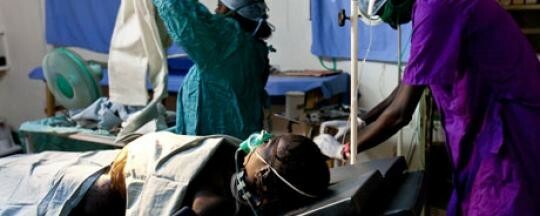Ruweng Administrative Area continues to grapple with the formidable challenge of malaria, with Pariang Hospital at the epicentre of concern, as revealed by a senior health official.
Speaking to Radio Tamazuj on Thursday, Benjamin Munybang, the Medical Director of Pariang Hospital, emphasized the ongoing surge in daily cases.
Munybang said the hospital is not only receiving patients directly but also being entrusted with referrals from diverse medical facilities across the administrative area. He, however, pointed out that a critical impediment lies in the shortage of specialized medical personnel equipped to manage malaria cases effectively.
Munybang emphasized the distinction between the specific situation at Pariang Hospital and the broader scenario across the entire administrative area. He stated, “I can only speak of the prevalence of malaria in Pariang Hospital specifically and not the whole of Ruweng Administrative Area the whole in particular.”
Munybang revealed staggering numbers of malaria cases reported at Pariang Hospital. “In the month of July alone, we recorded 2,272 cases of malaria at Pariang Hospital,” he disclosed. “These were for both confirmed and unconfirmed cases of malaria. And these figures represent 48% of the total patients seen in the hospital.” Breaking down the data, he elaborated, “If you divide the total number of malaria-related cases by thirty days in a month, it represents 73 malaria-related cases per day. Seventy-three malaria patients per day in a hospital like this one is very high. This shows that malaria is the leading cause of morbidity at Pariang Hospital.”
Discussing the challenges in malaria management, Munybang identified a significant issue: “The major problem here in Pariang in regard to malaria management is the lack of drugs basically, although in the first few days we have been supported by other partners in the region.” He went on to say, “There is a need for additional supplies of drugs from our partners such as the Ruweng Administrative Area government as well as from Greater Pioneer Operating Company (GPOC).”
Munybang pointed out several factors contributing to the rising cases of malaria. He highlighted, “Inaccessibility of roads is a major problem. Even if a person is having a simple case of malaria in a nearby village, it is hard for them to reach a government health facility or even a private health care facility in the shortest time possible because of the problem of transportation.” He also emphasized the scarcity of healthcare centres, stating, “The Primary Health Care Centers (PHCC) are scattered. You know, there are far villages which have no health care facilities at all.”
Addressing the shortage of drugs, Munybang expressed his frustration, “Lack of drug supply is another issue. Even if there is a health facility like Pariang Hospital, the issue of drug supply still persists.” He explained the complexity, mentioning, “From May, we have been informed that the truck bringing drugs to Pariang from Abiemnom had to return to Rumbek because of road inaccessibility or insecurity, whichever comes first.”
Regarding the impending rainy season, Munybang’s concerns grew evident: “We are in August. This is the middle of the rainy season. The situation will be far worse.” He called upon development partners to intensify their efforts, underscoring, “Double effort is needed by all partners because this is the middle of the rainy season and prevalence of mosquitoes is going to be very high. This is why we are calling on all our health partners to double their effort to contain this malaria problem.”
Munybang concluded with key messages to combat the prevalence of malaria. He urged, “My key message to the people of Ruweng is the use of mosquito nets.” He referenced a recent initiative, stating, “Some few months ago, Health Link South Sudan was involved in mass distribution of mosquito nets.” Munybang emphasized the urgency of early action, saying, “As soon as someone feels symptoms of malaria, there is no need to wait and see.”
Furthermore, he stressed the significance of environmental cleanliness, asserting, “Then there is the issue of stagnant water near the homestead. The issue of leaving the grass to grow tall around the home has to be addressed. If these prevention measures I have mentioned are addressed, we can address the problem of malaria.”




